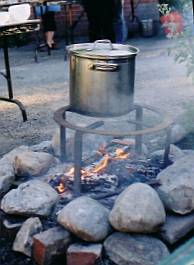Comments?
For the basics, see
- Website & Privacy Policies
- How To Get Involved
- The Role of the Park
Search options:
Department Site Map
Custodians:
posted February 03, 2007
EDITORIAL: COOKING FIRE WINTER SAFETY TESTS

Dufferin Grove soup pot
There was a flurry of e-mails and phone calls after the cooking fires were halted. The Fire officials e-mailed a protocol that required all cooking fires to be 100 feet from any structure (including the concrete rink house). That would mean no cooking fires, ever, at Dufferin Rink nor most other parks. A meeting was held, not involving any Dufferin Grove staff or friends. Councillor Adam Giambrone’s office tried to help.
But dealing with issues of safety is tricky nowadays. Hypothetical risk scenarios often trump examination of actual experience.
Cooking fires in parks are a gray area for Fire Departments. There’s some margin for error, since you can’t set a whole row of houses on fire, as you might if a gas barbecue canister explodes on your back patio. There’s also a specific exemption (no fire permit required) for small cooking fires in the provincial Fire Code legislation, although Toronto Fire Services seems to dismiss that. But the main thing is: Fire staff want to make sure that nobody gets hurt by fires, and so do Dufferin park staff. An opportunity to work together for a good cause!
Time for a bit of science. I’ve asked Councillor Giambrone’s office if they would request Toronto Fire Services to set up some public show-and-tell fire demonstrations, while it’s still winter, at Dufferin Grove. With fire trucks standing by (or the long, powerful zamboni hoses from the garage poised), park staff will make their usual-size cooking fire 100 feet away and the fire staff will demonstrate how this will set a structure on fire 90 feet away (e.g. the concrete block rink house, or the children’s garden fence. If that doesn’t work, the same tests can be done with a cooking fire 50 feet away, then 20 feet, then 10 feet, then 2 feet.
Then the park staff will make their usual-size cooking fire four feet from a tree, and the fire staff will try to show how that fire can set the tree on fire in winter, or singe it. And last, the fire staff will be asked to force some sparks from the sheltered rink cooking fire site onto the nearest wood: the benches, the garden rail fence, and the wooden boards covering the concrete community oven. This final part of the experiment would show whether, in the cold of winter, these structures can catch fire from sparks.
On the basis of these tests, Fire Services could then re-write their cooking fire protocols for parks, with a full sign-on from park users and on-site park staff. For example, even though the sheltered rink cooking fire circle (only used in winter) has not set the fence or the oven on fire in the past 6 years, what are the practical ways staff could make sure it doesn’t happen in the next 60 years either?
Applied science at its best! To find out more about the timing of this public demonstration, or to get involved in this issue: www.dufferinpark.ca “campfires.”
From park friend and researcher Belinda Cole:
“A clear principle in any democratic society is that people must know what the laws are, that they are expected to obey. In the case of this park, City officials have too frequently issued spoken edicts that have closed down or interfered with interesting and much-loved park events and projects, without making it clear what – if any – law or regulation forms the basis for their demand. (It’s also important to remember that city policy is not law in itself, and so it must be backed up by law to be enforceable.)
As citizens we are, of course, obliged to obey actual laws that are clearly presented and explained to us. At the same time, when a civil servant appears to be acting in an arbitrary way, beyond the scope of his or her authority, there may be legal avenues for challenging such behaviours and actions. This is a question worth researching.”
You can read the thread of conversation about this issue so far or email campfires@dufferinpark.ca if you want to receive email updates. You can also have a look at our campfires page for information about the campfire program, and Campfire Protest Letters for some community response.




 Printer friendly version
Printer friendly version